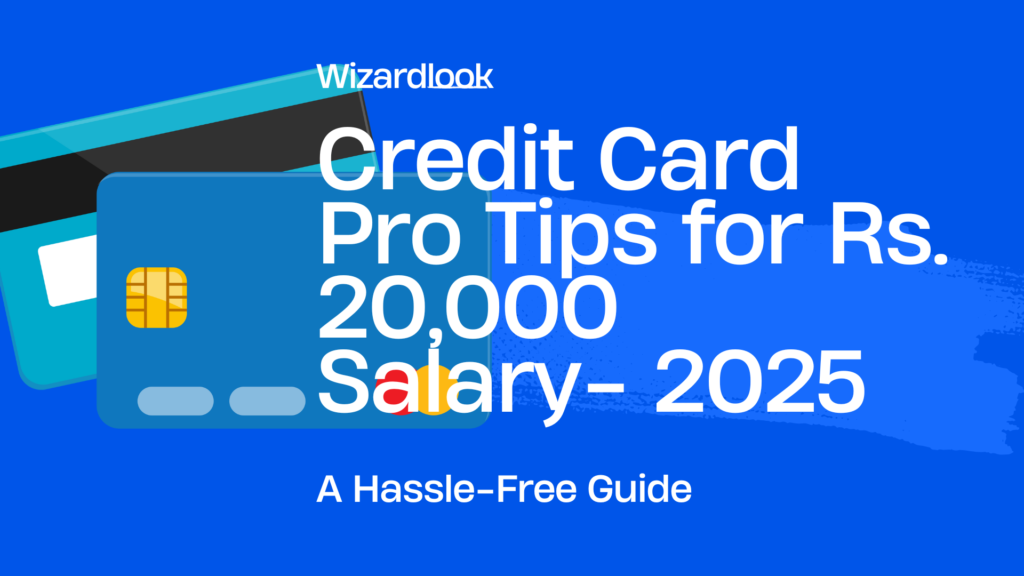
Credit cards can be powerful financial tools when used wisely but can quickly become a source of financial distress if mismanaged. In this guide, we’ll explore four critical aspects of credit card usage:
- How Credit Cards Make Money
- Why They Can Trap You or Benefit You
- The Correct Way to Use Credit Cards
- How to Choose the Right Credit Card
We’ll also share recommendations for six beginner-friendly credit cards for those with a salary around ₹20,000.
How Credit Cards Make Money
Credit card companies primarily earn through:
- Fees
- Annual fees, late payment penalties, and other charges such as card replacement fees.
- Merchant Fees
- Merchants pay a fee (1-3%) to accept credit card payments, which is shared between the card company and payment processor.
- Customer Interest
- The most significant revenue source. If you fail to pay your bill in full, you’re charged interest on the unpaid balance, often at rates of 36-50% annually (3-4% monthly).
Using Credit Cards Correctly
Pay the Full Amount Before the Due Date
- Avoid paying interest by clearing your dues fully, not just the minimum amount. This allows you to enjoy an interest-free loan for up to 45 days.
This practice also helps maintain a healthy credit score, demonstrating financial responsibility to lenders. Moreover, it keeps you out of the debt cycle, preventing high-interest accumulation that can lead to financial stress
Set up reminders or enable auto-pay to ensure you never miss the due date. Always spend within your means, so paying the full amount becomes a habit rather than a challenge.
Avoid Minimum Payments
- Avoiding minimum payments on your credit card is essential for maintaining financial stability. While paying only the minimum due keeps your account active and prevents late fees, it also leaves a significant portion of your balance unpaid, which accrues high interest—often 3-4% per month. This compounding interest can quickly snowball, leading to a cycle of mounting debt that becomes difficult to manage
Spend Wisely
- Spending wisely with a credit card is the key to maximizing its benefits while avoiding financial pitfalls. Always treat your credit card like cash—only spend what you can afford to repay in full by the due date. Avoid unnecessary purchases or impulsive spending, even if a higher credit limit is available.
- Using your credit card for regular, budgeted expenses like groceries or bills can help you earn rewards and build a positive credit history. However, ensure that these expenses align with your income and financial goals.
- Responsible usage not only keeps you debt-free but also helps you take full advantage of your card’s perks without falling into a cycle of debt.
Choosing the Right Credit Card
When selecting a credit card, consider the following:
1. Understand Your Spending Habits
- Dining and Entertainment: Option for a dining or lifestyle card.
- Travel: Choose a travel rewards card with perks like air miles or lounge access.
- Online Shopping: Look for high cashback or reward points for online purchases.
2. Compare Annual Fees and Benefits
- When choosing a credit card, comparing annual fees and benefits is crucial to ensure you get the most value for your money. Cards with higher annual fees often come with superior perks such as enhanced rewards, exclusive access to airport lounges, or complimentary services.
- However, it’s important to assess whether these benefits align with your spending habits and lifestyle.
- Carefully weigh the rewards and perks against the fee to decide if the card provides good value for your needs.
3. Check Rewards and Redemption
- When selecting a credit card, it’s essential to check the rewards program and how easily points can be redeemed. Many cards offer incentives like cashback, travel miles, or shopping vouchers, to different spending habits.
- However, not all rewards systems are equally beneficial—some may have complicated redemption processes, expiry dates for points, or limited options for using them.
- Choose a card with straightforward redemption terms and rewards that align with your lifestyle. Whether it’s free flights, discounts on shopping, or direct cashback, ensure the rewards system adds genuine value to your spending.
4. Assess Interest Rates and Fees
- When choosing a credit card, it’s important to assess the interest rates and additional fees. Even a small difference in interest rates can have a significant impact on your overall debt if you carry a balance. Look for cards with lower interest rates, especially if you tend to carry balances month to month.
- Additionally, check for other hidden fees like foreign transaction fees, late payment charges, or over-limit fees that could add up over time.
- By carefully comparing interest rates and fees, you can ensure that the card you choose is cost-effective and works well with your financial habits.
Here are the interest rates for the major banks’ credit cards in 2024:
HDFC Bank: The interest rate generally ranges from 23.88% to 43.2% per annum, depending on the specific card and the customer’s creditworthiness.
Axis Bank: The monthly interest rate will increase to 3.75% per month, which translates to approximately 45% per annum.
SBI Card: The interest rates vary, but they typically range from 24% to 36% per annum.
ICICI Bank: The interest rates for ICICI Bank credit cards also vary, generally ranging from 24% to 42% per annum.
Top Six Credit Card Suggestions for Beginners
(For individuals with a salary of ₹20,000 or less, these cards are good starting points. Remember to research based on your specific needs.)
- Axis Bank Vistara Credit Card
- Great for frequent travelers, offering travel benefits and Vistara vouchers.
- Amazon Pay ICICI Credit Card
- Ideal for online shopping, with cashback on Amazon purchases.
- HDFC Millennia Credit Card
- Offers cashback on online spends, dining, and entertainment.
- SBI SimplyCLICK Credit Card
- Designed for online shopping with great reward points.
- IndusInd Bank Platinum Card
- No annual fee, decent rewards for regular spending.
- ICICI Coral Credit Card
- Balanced benefits for dining, movies, and shopping.
Final Thoughts
Credit cards can be your financial ally when used responsibly. They offer convenience, rewards, and even emergency credit. However, reckless usage can lead to unmanageable debt and financial stress. Always remember:
- Spend within your means.
- Pay your dues on time and in full.
- Choose a card that complements your lifestyle.





